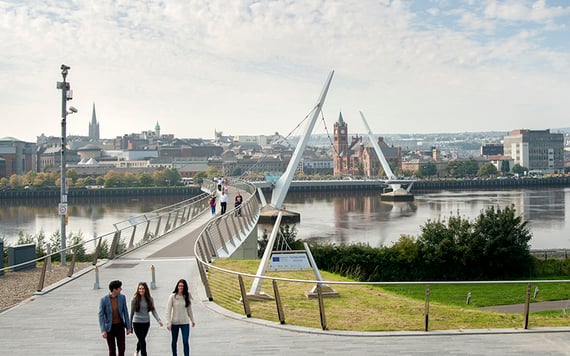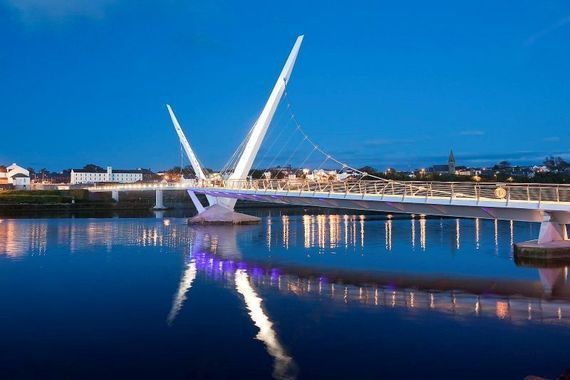It is a dispute almost as old as that between Ireland and England.
Derry, as most of its inhabitants call it, was rechristened Londonderry in 1613 when a Royal Charter proclaimed, "that the said city or town of Derry, forever hereafter be and shall be named and called the city of Londonderry."
The name change was thrust upon the city by King James VI of Scotland, newly minted as King James I of England and Ireland following the death of his cousin Queen Elizabeth I in 1603. The astronomical sum of £60,000 had been raised by livery companies in the English capital and the result was one of the most ambitious projects of the Ulster Plantation.
The charter also established a new County of Londonderry, which largely replaced the County of Coleraine – named for what was then the county’s biggest town.

The beautiful Derry city.
For a while, the new, lengthy name is thought to have stuck in popular usage, but around the 19th century, it is thought that the prefix fell into disuse. The acclaimed map maker Samuel Lewis wrote in 1849, “It was originally and is still popularly called Derry... the English prefix London was imposed in 1613... and was for a long time retained by the colonists, but has... fallen into popular disuse".
That most quintessentially Protestant organization, The Apprentice Boys of Derry, was founded in 1814 and the use of the abbreviated name suggests that at the time it was normal and natural for a loyal Protestant to use the town’s original name.
The Boundary Commission of 1925, which was set up to redraw the north-south border after partition, also makes mention of the name Derry – despite the commission’s unionist majority. One commissioner, attorney, and newspaper editor Joseph Fisher, was such a unionist that he argued that Donegal should become part of Northern Ireland, telling his colleagues, “Ulster can never be complete without Donegal. Donegal belongs to Derry, and Derry to Donegal.”
Derry I cherish forever.
— Seamus Heaney (@HeaneyDaily) March 21, 2017
It is calm, it is clear.
Crowds of white angels on their rounds
At every corner.
Such a quote illustrates how, once even unionist diehards like Fisher were content with 'Derry,' the name now most associated with its nationalist community.
All that was to change when the Troubles broke out some 40 years later. With the habits and hearts of both communities hardened against each other the use of the name became highly contentious and a simple marker of which community a person belonged to.
The culture war came to a head in 1984 when a nationalist majority council formally requested that the name of the body be changed from ‘Londonderry City Council’ to ‘Derry City Council’.
The name change was decried at the time by Willie Ross, Member of Parliament for East Londonderry, as “an anti-British move by the most extreme Republican movements in Londonderry and the rest of Northern Ireland."
But despite Ross’s outrage the British Government, seemingly unconcerned by such an ‘anti-British’ move, nodded the change through and the brass plaques of Londonderry City Council were unscrewed and put away.
Unionist councilors stormed out of the city chambers and it was some time before they returned.
For all the unionists' fury, the change had invoked, the changing of the city council’s name did not affect the name of the city or county which were distinct legal entities. While councilors mused as to whether they should go the whole hog and ask for the city to be renamed too, ultimately, they decided against “petitioning an English Queen to change the name of our Irish city.”
Later, many began half-jokingly, half-seriously to refer to it as “Stroke City” – in reference to the habit of nonpartisan bodies calling it ‘Derry/Londonderry.’
But in 2007, the idea of a name change was revived by a Sinn Féin councilor. An Equality Impact Assessment revealed, to no one’s surprise, that Catholics and nationalists supported the change, but Protestants and unionists were opposed.
With the city’s population so starkly divided along sectarian lines, the survey recommended that both ‘Derry’ and ‘Londonderry’ be made joint official names alongside the Irish language version ‘Doire.’
However, once the report had been received by the city council, the nationalist Social Democratic and Labor Party’s councilors joined with unionists to vote down further actions, effectively killing off the issue.
As such, both the city and county remain in something of a no man’s land and controversies still occasionally flare up over the issue.
A map used in a state exam in the south that only referred to Londonderry led to a complaint in the Irish Senate, and it is common to see the ‘London’ part of the city’s name spray-painted over on road signs in republican areas of the north.
Much like the flying of the Union Jack over Belfast City Hall, if a symbolic change is ever to be made, it will likely ignite another clash of Ireland’s orange and green traditions. The history of Northern Ireland ‘twas ever thus.
H/T: Derry Journal/Londonderry Sentinel.
* Originally published in May 2017. Updated in May 2025.




Comments